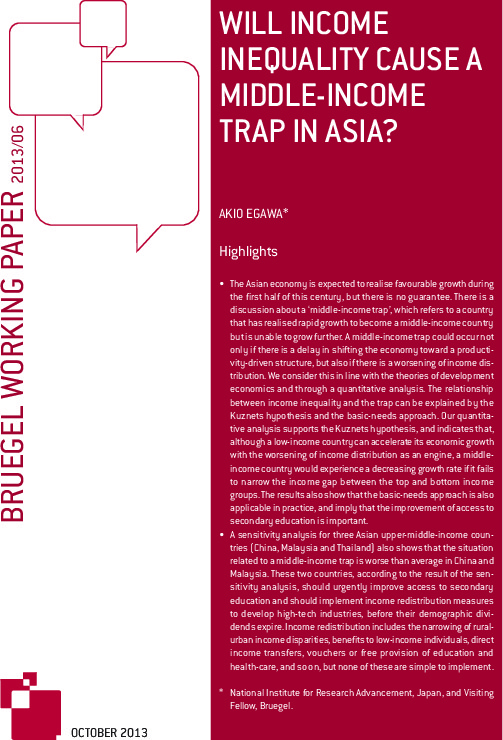Working Paper
Will income inequality cause a middle-income trap in Asia?
A middle-income trap could occur not only if there is a delay in shifting the economy toward a productivity-driven structure, but also if there is a worsening of income distribution.We consider this in line with the theories of development economics and through a quantitative analysis.
The Asian economy is expected to realise favourable growth during the first half of this century, but there is no guarantee. There is a discussion about a ‘middle-income trap’, which refers to a country that has realised rapid growth to become a middle-income country but is unable to grow further. A middle-income trap could occur not only if there is a delay in shifting the economy toward a productivity-driven structure, but also if there is a worsening of income distribution.We consider this in line with the theories of development economics and through a quantitative analysis. The relationship between income inequality and the trap can be explained by the Kuznets hypothesis and the basic-needs approach. Our quantitative analysis supports the Kuznets hypothesis, and indicates that,although a low-income country can accelerate its economic growth with the worsening of income distribution as an engine, a middle income country would experience a decreasing growth rate if it fails to narrow the income gap between the top and bottom income groups. The results also show that the basic-needs approach is also applicable in practice, and imply that the improvement of access to secondary education is important.
A sensitivity analysis for three Asian upper-middle-income countries(China, Malaysia and Thailand) also shows that the situation related to a middle-income trap is worse than average in China and Malaysia. These two countries, according to the result of the sensitivity analysis, should urgently improve access to secondary education and should implement income redistribution measures to develop high-tech industries, before their demographic dividends expire. Income redistribution includes the narrowing of rural urban income disparities, benefits to low-income individuals, direct income transfers, vouchers or free provision of education and health-care, and so on, but none of these are simple to implement.







